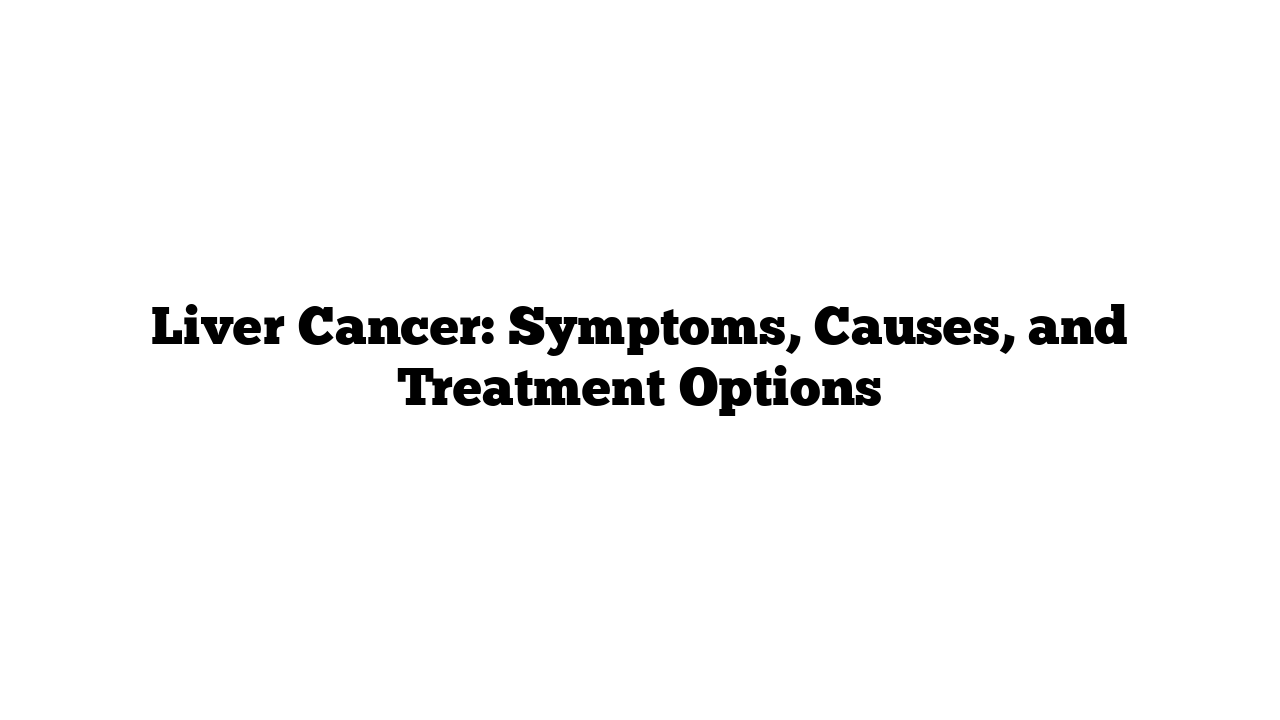Liver cancer is a serious condition that affects one of the most important organs in the body. The liver, located in the upper right part of the abdomen, plays a critical role in detoxification, digestion, and nutrient storage. This guide explains liver cancer comprehensively, including its causes, symptoms, diagnosis, and treatment options.
What is Liver Cancer?
Liver cancer occurs when abnormal cells grow uncontrollably in the liver. It can start in the liver (primary liver cancer) or spread from other organs (secondary or metastatic liver cancer). Primary liver cancer is more common in people with underlying liver disease.
Types of Liver Cancer
Liver cancer is classified into different types based on the cells where it originates:
1. Hepatocellular Carcinoma (HCC)
- The most common form of primary liver cancer.
- Usually begins in liver cells (hepatocytes).
- Common in individuals with cirrhosis or chronic hepatitis.
2. Cholangiocarcinoma (Bile Duct Cancer)
- Affects the bile ducts, which transport bile from the liver to the intestines.
- Divided into intrahepatic (inside the liver) and extrahepatic (outside the liver) types.
3. Angiosarcoma and Hemangiosarcoma
- Rare types of liver cancer that begin in blood vessels of the liver.
- Typically aggressive and fast-growing.
4. Hepatoblastoma
- A rare form of liver cancer that occurs in children, usually under 5 years old.
Symptoms of Liver Cancer
Symptoms often appear in advanced stages, making early detection challenging. Watch for:
- Persistent pain or discomfort in the upper abdomen or back.
- Unexplained weight loss.
- Loss of appetite or nausea.
- Jaundice (yellowing of the skin and eyes).
- Swelling in the abdomen.
- Fatigue or weakness.
- Dark urine or pale stools.
If you experience any of these symptoms, it’s important to seek medical advice promptly.
Risk Factors for Liver Cancer
Certain conditions and lifestyle factors can increase the risk of liver cancer:
1. Chronic Liver Disease
- Cirrhosis caused by hepatitis B or C infections or excessive alcohol use is a leading risk factor.
2. Obesity and Diabetes
- Non-alcoholic fatty liver disease (NAFLD) associated with obesity and diabetes can lead to liver cancer.
3. Aflatoxin Exposure
- A toxin found in contaminated grains and nuts can damage the liver over time.
4. Family History
- A family history of liver cancer increases your risk.
5. Smoking
- Smoking significantly elevates the risk of liver cancer.
Diagnosis of Liver Cancer
Early detection is crucial for better outcomes. Here are common diagnostic tools:
1. Imaging Tests
- Ultrasound: Often the first step in detecting liver abnormalities.
- CT Scans and MRI: Provide detailed images to identify tumors and their size.
2. Blood Tests
- Alpha-Fetoprotein (AFP) Test: Elevated levels of AFP can indicate liver cancer.
3. Liver Biopsy
- Involves taking a tissue sample from the liver for microscopic examination.
Treatment Options for Liver Cancer
The choice of treatment depends on the stage, type, and overall health:
1. Surgery
- Liver Resection: Removes the tumor and surrounding tissue.
- Liver Transplant: An option for eligible patients with severe liver damage.
2. Ablation Therapy
- Destroys cancer cells using heat (radiofrequency ablation) or cold (cryoablation).
3. Chemotherapy and Targeted Therapy
- Chemotherapy: Uses drugs to kill cancer cells or stop their growth.
- Targeted Therapy: Focuses on specific genes or proteins involved in cancer growth, such as sorafenib.
4. Immunotherapy
- Enhances the immune system’s ability to attack cancer cells.
5. Radiation Therapy
- High-energy rays target and shrink tumors.
Prevention of Liver Cancer
While not all cases can be prevented, taking proactive steps can reduce your risk:
- Get Vaccinated: Protect against hepatitis B with vaccination.
- Avoid Excessive Alcohol: Limit alcohol consumption to prevent liver damage.
- Maintain a Healthy Weight: Reduce the risk of NAFLD by eating a balanced diet and exercising.
- Regular Screenings: High-risk individuals should undergo routine liver cancer screenings.
Living with Liver Cancer
Coping with liver cancer involves physical and emotional adjustments. Support options include:
- Joining support groups to connect with others.
- Regularly consulting your healthcare team for ongoing care.
- Following a healthy lifestyle to manage symptoms and treatment side effects.
For more detailed guidance and tips, visit medicaltimes.io.
Top 10 FAQs About Liver Cancer
1. What are the early signs of liver cancer?
Persistent abdominal pain, jaundice, and unexplained weight loss are common early signs.
2. Is liver cancer hereditary?
While family history can increase risk, most cases are related to lifestyle or chronic liver conditions.
3. How is liver cancer diagnosed?
Through imaging tests, blood tests, and sometimes a liver biopsy.
4. What is the survival rate for liver cancer?
Survival depends on the cancer’s stage and treatment but is generally better with early detection.
5. Can liver cancer be cured?
Early-stage liver cancer can sometimes be cured with surgery or a liver transplant.
6. Who is at the highest risk of liver cancer?
People with cirrhosis, chronic hepatitis B or C, or a history of heavy alcohol use are at the highest risk.
7. How does hepatitis contribute to liver cancer?
Chronic hepatitis B or C infections can lead to liver damage and increase cancer risk.
8. Is liver cancer common in the USA?
Liver cancer is relatively uncommon but is one of the leading causes of cancer-related deaths.
9. What role does diet play in liver cancer prevention?
A healthy diet rich in fruits, vegetables, and whole grains can lower your risk of liver damage.
10. Are there alternative treatments for liver cancer?
While conventional treatments are most effective, some patients explore complementary therapies under medical supervision.
